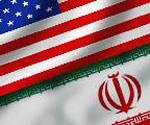 Washington Post: Recent revelations from the International Atomic Energy Agency that Iran has both continued and expanded its uranium enrichment activities have focused attention anew on U.S. policy toward the Islamic Republic.
Washington Post: Recent revelations from the International Atomic Energy Agency that Iran has both continued and expanded its uranium enrichment activities have focused attention anew on U.S. policy toward the Islamic Republic.
The Washington Post
By Andrew K. Davenport and Ilan Berman
 Recent revelations from the International Atomic Energy Agency that Iran has both continued and expanded its uranium enrichment activities have focused attention anew on U.S. policy toward the Islamic Republic — and what more can be done to stop Iran’s march toward the bomb.
Recent revelations from the International Atomic Energy Agency that Iran has both continued and expanded its uranium enrichment activities have focused attention anew on U.S. policy toward the Islamic Republic — and what more can be done to stop Iran’s march toward the bomb.
This is, necessarily, a conversation about sanctions. Given the advanced state of Iran’s nuclear program and the growing possibility that third parties — namely, Israel — might resort to force to stop it, it stands to reason that the full arsenal of U.S. economic and financial sanctions would be deployed against the Iranian threat. Yet it has not been.
The reality is that current sanctions policy is simultaneously extensive and flimsy. It amounts, in large part, to labeling a broad array of business activity as “sanctionable.” But with the exception of a handful of cases, the actual sanctioning of violators has been markedly absent.
Reporters and pundits alike have been complicit in ignoring this important distinction. Accordingly, it may come as a surprise to many that just about every piece of sanctions legislation and every executive order adopted over the past 16 years and advertised as “tightening the screws” on Iran has offered an escape hatch that gives the president discretion over which violators are targeted and whether they are named and penalized.
The result is that very few “sanctionable” companies are ever actually penalized — or even identified. Instead, successive administrations of both parties have opted against the strict application of economic penalties on countries and companies that do business with Iran.
President Obama takes great pride in pointing out that his administration has levied the most extensive sanctions to date against the Iranian regime. Indeed it has; much more than its predecessors, the Obama administration has actively targeted Iran’s energy sector. The centerpiece of the administration’s sanctions effort, the Comprehensive Iran Sanctions, Accountability and Divestment Act of 2010, known as CISADA, focused on one of Iran’s major economic vulnerabilities: its need to import refined petroleum from foreign sources.
But enforcement has lagged far behind. In the rare instances when the White House has chosen to enforce CISADA and other measures, it has penalized only obscure violators and those with the most minimal impact on the global — and the Iranian — economy. Arguably, the most prominent entity targeted by CISADA is Venezuela’s state oil company, PDVSA, and even its ties to the U.S. market remained largely untouched. The last five companies to be sanctioned by the Obama administration — FAL Oil Co., Bank of Kunlun, Kuo Oil, Zhuhai Zhenrong Co. and Elaf Islamic Bank — are all marginal entities in Iran’s economic edifice.
The reason for the stunted state of U.S. sanctions policy is understandable but deeply unfortunate. Administration after administration has been reluctant to enforce sanctions against foreign companies with ties to Iran because of the diplomatic fallout that would invariably accompany such a decision. More often than not, the most egregious violators are companies headquartered in countries that are close U.S. allies or represent key strategic relationships for the United States, such as China and Russia. Fully implementing U.S. sanctions would require the political will to persist through a temporary downturn in those ties.
President Ronald Reagan demonstrated such political will when he sanctioned Western European companies that defied orders not to supply U.S.-origin oil and gas equipment and technology to the Soviet Union for the development of its Siberian gas pipeline. Had it not eventually been thwarted, that project would have nearly doubled Soviet annual hard currency revenue and created a dangerous level of dependency in Western Europe on Soviet supplies of natural gas.
Today such fortitude is strikingly absent. But at what cost? Obama’s failure to fulfill his pledge to fully exhaust all non-military options regarding Iran suggests that the White House thinks the potential of sanctions to influence Iranian behavior is overblown and not worth the diplomatic consequences.
The full enforcement of sanctions is a logical intermediary step before the use of force. The administration’s failures on that front suggest that it views actual warfare as more palatable than ruffled diplomatic relationships with countries such as China, the primary violator of “sanctionable” activity currently on the books. That, in turn, makes the likelihood of some sort of conflagration over Iran’s nuclear program all the more probable.
Andrew Davenport is chief operating officer of RWR Advisory Group, an economic and geopolitical risk consultancy. Ilan Berman is vice president of the American Foreign Policy Council, a Washington-based think tank focused on foreign policy and national security.


